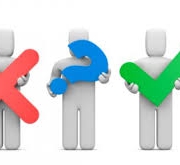Are Jerks More Likely to Have Workplace Power?

I admit it. In the last several years or so, I have bandied about the statistic that a fifth of CEOs are psychopaths. It seems to be conventional wisdom, or at least a predominant presumption, that high-power positions tend to select for awful people. If you start typing, “Most CEOs…” into Google, revealing “suggested” searches emerge—namely, “Most CEOs…are sociopaths.” Then you have “…are tall,” “…are white.” And, of course, “…are psychopaths.”
This appears to be a myth. Not too long ago, it was promoted by psychologist Tomas Chamorro-Premuzic, the author of Why Do So Many Incompetent Men Become Leaders?: (And How to Fix It). In a CNBC piece that tops Google search results for “Most CEOs are sociopaths,” he cited an Australian Psychological Society press release claiming, based on one small study of 261 corporate professionals in the supply chain management industry, that corporate psychopaths are common. Twenty-one percent of the study’s participants were “found to have clinically significant levels of psychopathic traits—a figure comparable to prison populations.” Shocking!
There’s no edge to being a jerk.
Which should tip anyone off. Results like that are usually too good to be, well, good. A 2019 meta-analysis of research on psychopathy and leadership concluded that “concern over psychopathic tendencies in organizational leaders may be overblown…” It’s good news that psychopathic people don’t appear to be disproportionately represented in leadership positions. After all, CEO personality, research shows, is a key predictor of firm performance. “A burgeoning literature rooted in psychology,” the authors of a 2020 paper say, “has shown that leaders with the dark triad personality traits (i.e., narcissism, Machiavellianism, and psychopathy) can have harmful effects on organizations.” Narcissism is a sense of entitled self-importance; Machiavellianism, an inclination to strategically exploit and deceive others; and psychopathy, a tendency to callousness and cynicism.
Peter Harms, one of the authors of the 2019 meta-analysis, told Ars Technica, “We’re not doing anything really to weed out [psychopathic] people. They’re just as likely to be leaders as anyone else. If they really are as destructive as we think they are, we should be doing more to keep them out of leadership positions.” Harms is right about that—we should be doing more. Hiring managers could, for example, put less of an emphasis on interviews, and even on past performance, and more on understanding a candidate’s reputation.
“Too often, when boards select CEOs, especially outside CEOs, they do it through interviews. But interviews play to the strength of a narcissist. And you can’t just look at performance, because they can fake performance,” by taking credit for others’ work and ideas, or by simply making up accomplishments, Charles O’Reilly, a professor of management at Stanford University, said. “What would really be far more illuminating would be to go talk to the people who’ve worked for them and with them in the past. You have to get data from people who have seen that person operating. But that typically isn’t what happens.”
Subscribe to the Ethical Systems newsletter
Which is why it’s refreshing to see that the authors of a new study, published in the Proceedings of the National Academy of Sciences, did get that sort of data. And they found something encouraging—that “people with disagreeable personalities (selfish, combative, and manipulative) do not have an advantage in pursuing power at work.” That means that psychopaths, who are extremely disagreeable, are just as likely as agreeable people—those who are generally considerate, optimistic, and warm—to move up a workplace power hierarchy. There’s no edge to being a jerk.
The researchers, a team of organizational scholars and psychologists led by Cameron Anderson, of U.C. Berkeley, took care, to an impressive degree, to set up a strong experimental design. Their description of it is worth quoting in full:
An ideal study of whether disagreeable individuals attain more power in their careers than agreeable individuals would have several features. First, it would be longitudinal. Concurrent designs that assess personality and power simultaneously leave the origin of causality unclear, in part, because power can foster disagreeable behavior. Second, the study would need to span a considerable length of time—years rather than weeks or months—to allow for the effects of personality to unfold. Third, it would examine individuals in a wide range of organizations and industries to help maximize generalizability. Fourth, it would study the mechanisms that underlie any relationship between disagreeableness and power, which is critical if we are to fully understand why disagreeable individuals attain power or not. Fifth, it would assess power using reputational as well as structural indices. Power in organizations is based not just on formal rank, but also on factors such as individuals’ social network and control over resources. Because organizational actors are remarkably accurate in assessing their own and others’ power, reputational indices are seen as essential to the study of power. Finally, it would examine a large enough sample to provide sufficient statistical power and allow for tests of possibly curvilinear and interaction effects. The current study involved two preregistered studies that met all of the criteria above.
Anderson and his colleagues concluded that people high in extroversion, not disagreeableness, have an edge in gaining workplace power. That’s because extraverted people, who are socially energetic, assertive, and generally give off positive emotions, tend to excel in each of the four paths to organizational power.
Of course, there’s the very old-fashioned, domineering and aggressive method of inspiring fear. Chimpanzees and gorillas intimidate and coerce others to gain social rank, and humans do this, too. But thankfully, we’re not limited to just that. We can also be political, noting who’s influential and whose good graces one might have to be in to achieve a goal, while also being shrewd about how to exercise what power you have in the most appropriate and effective manner. There’s also a communal sort of approach. This would mean manifesting a spirit of generosity, acting on a willingness to help others. You accrue a reputation for benevolence as a result, which boosts your status. Being competent can also move you to more powerful positions, especially when others feel they can learn from your expertise. This “prestige” behavior suggests that you have qualities that are important for attaining collective goals, like having skills critical to your group’s success. This often rightly lands people in positions of influence and responsibility.
The researchers found that achieving higher power at work was associated with engaging in all of these—being aggressive, politically savvy, helpful, and masterful. And it is extraverts who tend to do the most of each. Disagreeable people, particularly psychopaths, on the other hand, focus mostly on aggression. They have no generosity of spirit. So, whatever gains in power their intimidation might afford is negated, or offset, the researchers found, by the poor relationships they form.
From a business-ethics perspective, this is heartening. It means organizations don’t have to grapple with the burden that jerks, by virtue of their personality, are more likely to wield more power than more considerate and scrupulous people. If it were true that disagreeable people had an edge, it would, to some degree, make the challenge of creating an ethical culture harder since leadership is crucial to fostering an ethical climate. And it just seems unlikely that jerks in power will conduct that sort of effort genuinely or effectively.
This doesn’t obviate the need to deal with the thorny fact that, as people gain power, they seem to become more disagreeable as a result. But that’s a much more manageable quandary when the people who are gaining power aren’t already behaving like jerks.
Brian Scott Gallagher is the Communications Director at Ethical Systems. Follow him on Twitter @bsgallagher.






